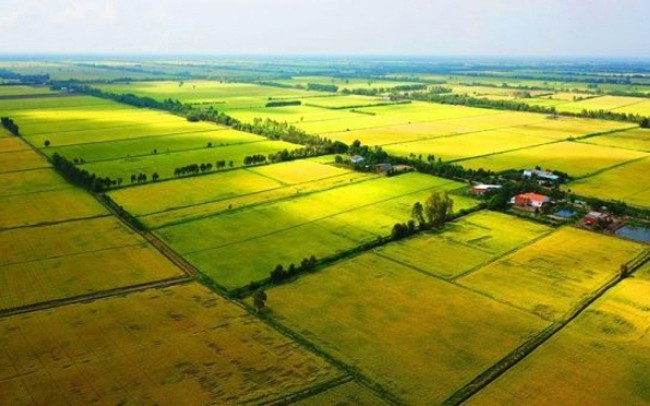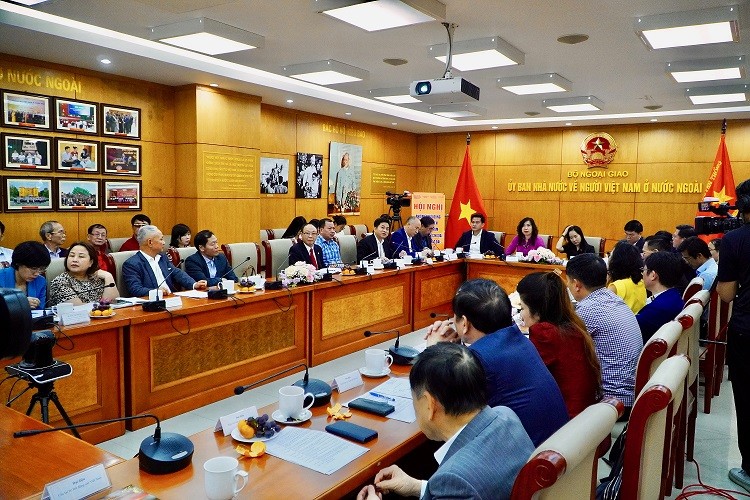
Land Law of 2024: Enhancing the people's ownership rights
Latest
Accordingly, one of the most significant highlights is that the 2024 revised Land Law has added many contents to ensure and promote the people's ownership rights in land management activities.
 |
| One of the most notable points is the addition of many contents in the Land Law (amendment) to ensure and enhance the people's ownership rights. |
Adding the people's rights to land
Ensuring the people's ownership rights is a requirement and essence of the socialist state of the people, by the people, for the people.
This principle has been emphasized by the Party in many documents; especially in the Resolution of the 13th Party Congress, the Party affirmed: "Continuing to promote socialist democracy, increasingly improving the people's ownership rights in deciding on the country's major and significant issues." Ensuring the people's ownership rights in land management activities also stems from the characteristics of our country's regime of all-people ownership of land.
The regime of all-people ownership of land in our country was officially established under Article 19 of the 1980 Constitution with the regulation "land, mountains, rivers, lakes, mines,... are all owned by the people." On this basis, the regime of all-people ownership of land continues to be maintained and affirmed in Article 17 of the 1992 Constitution and currently in Article 53 of the 2013 Constitution.
Compared to previous Land Laws, especially the 2013 Land Law, the 2024 Land Law has added many contents about citizens' rights to land, specifically with 6 contents specified in Article 23.
Among them, two important contents are Clause 1 regulating the right "to participate in building, commenting, and supervising the perfection and implementation of land policies and laws"; and Clause 2 regulates the right "to participate in state management, offer opinions, discuss and propose, reflect to state agencies about land management and use activities."
These two contents show that the people's ownership rights in participating in state management, social management have basically been specifically and fully recognized in the 2024 Land Law.
According to land governance theory, to enhance the efficiency of land management in a market economy, the transformation of land management institutions should be changed in the direction of giving people more ability to participate in state decisions on land and the land management process.
Thus, continuing to promote citizens' rights to land not only helps perfect the socialist democracy but also contributes to enhancing the effectiveness, efficiency of land management and use, helping to unlock this important resource for the country's construction and development in a new phase.
However, the contents regulating citizens' rights to land in the 2024 Land Law still need to be further specified in guiding documents or related laws with specific enforcement mechanisms so that people can fully, effectively, and substantively exercise these rights.
The regulation of enforcement mechanisms for citizens' rights to land is the first step to institutionalize the enforcement mechanisms for the rights of the representatives of the all-people ownership of land.
| The Land Law (amendment) of 2024 was passed by the National Assembly at the 5th extraordinary session comprising 16 chapters and 260 articles, fully institutionalizing and embodying the spirit of Resolution No. 18-NQ/TW dated June 16, 2022, of the 5th Plenum of the 13th Party Central Committee, in accordance with the Constitution, coherent and unified with the current legal system. |
Regulating specifically the people's right to access land information
In addition to the regulations on citizens' rights to land in Article 23, the 2024 Land Law has a separate article (Article 24) about the Right to access land information.
Accordingly, citizens have access to the following land information:
(i) planning, land use plans, related land use plans that have been decided, approved by competent state agencies; (ii) results of land inventory and statistics; (iii) land allocation, land leasing; (iv) published land price lists; (v) compensation, support, resettlement plans when the State recovers land that have been approved by competent authorities; (vi) results of land inspection, dispute resolution, complaint and denunciation resolution about land, results of handling legal violations about land; (vii) administrative procedures in the field of land; (viii) legal documents on land; (ix) other land information as prescribed by law.
The right to access information is one of the most important components for a state of law to be open and transparent. The openness of activities, information, and data of state agencies enables people to monitor the activities of state agencies.
Thus, promoting accountability, enhancing the management and executive capacity of government levels and each agency unit, contributing to implementing the principle "People know, people discuss, people do, people check, people supervise, people benefit" step by step into life.
Currently, the right to access information is one of the basic human rights in the group of civil-political rights recognized in the 1948 United Nations Universal Declaration of Human Rights, the 1966 International Covenant on Civil and Political Rights of which Vietnam is a member.
Additionally, the right to access information is affirmed in many other international treaties such as the United Nations Convention against Corruption, the Rio Declaration on Environment and Development, the UNECE Convention on Access to Environmental Information.
In Vietnam, the right to access information is constitutionalized in the 2013 Constitution and institutionalized into the 2016 Law on Access to Information.
Specifying the people's right to access land information helps citizens effectively monitor the issuance of decisions and the implementation of land management activities by state agencies. This significantly contributes to the efforts in combating corruption, negativity, and enhancing the effectiveness of state management in the field of land.
 |
| The State Committee for Overseas Vietnamese, under Ministry of Foreign Affairs, co-organized a conference both in-person and online to disseminate content related to Vietnamese people residing abroad in the Land Law (amendment), the Housing Law (amendment), and the Real Estate Business Law (amendment), on March 26, 2024. (Photo: Nguyen Viet) |
Promoting the people's ownership rights in land planning
Land planning in general includes land planning and land use plans. Land planning is a strategic activity, deciding how land is managed and used for what purposes in each period, each stage.
Accordingly, the people are one of the stakeholders and play an important role in the land planning process. In reality, land planning has a significant impact on people's land use rights; activities such as land recovery, change of land use purpose, transfer of land use rights, construction rights on land... all based on local land planning.
Therefore, to promote the people's ownership rights, it is necessary to perfect mechanisms for people to participate more effectively and substantively in the land planning process.
Ensuring and promoting the people's ownership rights in land planning activities will help the planning reflect the aspirations, potential of land, and land use needs of the local area better. However, the most important is still to ensure the supervision and decision-making of the people over land planning activities as the owners of the land.
Besides, ensuring the people's ownership rights in land planning activities is a prerequisite for promoting democracy in land management, contributing to the perfection of mechanisms to control state power and combat corruption in the field of land; at the same time, strengthening social consensus.
The practical implementation of the 2013 Land Law showed that the situation of "suspended" planning is quite common, mostly due to planning not matching reality, not meeting the needs, aspirations of the people. From there, leading to planning being approved but unable to be implemented, the work of land clearance to deploy projects according to planning is also obstructed, forming "suspended" projects....
Compared to the regulations of the 2013 Land Law revised, supplemented in 2018; the 2024 Land Law has more fully added about the process of consulting opinions for provincial-level land use planning, annual land use plans at the district level.
Especially, for consulting opinions on district-level land use planning, annual land use plans at the district level, the 2024 Land Law added more forms of opinion collection such as: collecting opinions through public information about the content of planning, land use plans on the electronic information page of the land use planning agency at the district level, People's Committees at the commune level and publicly displayed at the headquarters of the People's Committees at the commune level, residential areas, publicly displayed, exhibited at the culture house of villages, hamlets, clusters, tribes, communities, organizing conferences, seminars, and issuing opinion polls to households, individuals representing communes, wards, towns.
Thus, ensuring that the opinion collection takes place substantively, people in the planned area are fully consulted, reflecting their thoughts and aspirations for the draft planning.
Moreover, the 2024 Land Law also added regulations on the need to publicly disclose contributions and the process of considering, explaining contributions on the electronic information page of the land use planning agency at the district level, annual land use plans at the district level. Thereby, ensuring that the contributions for planning, land use plans are fully, accurately compiled; ensuring contributions are considered, explained objectively, transparently, seriously, and thoroughly.
It can be affirmed that the 2024 Land Law has fundamentally inherited the progressive points and addressed the shortcomings in the 2013 Land Law.
Therein, the content on ensuring and promoting the people's ownership rights has been gradually perfected, laying an important foundation for mobilizing stronger participation of the people in land management activities, contributing to the perfection of socialist democracy, building a socialist rule-of-law state of Vietnam of the people, by the people, for the people.
| The 2024 Land Law added more forms of opinion collection such as: collecting opinions through public information about the content of planning, land use plans on the electronic information page of the land use planning agency at the district level, People's Committees at the commune level and publicly displayed at the headquarters of the People's Committees at the commune level, residential areas, publicly displayed, exhibited at the culture house of villages, hamlets, clusters, tribes, communities, organizing conferences, seminars, and issuing opinion polls to households, individuals representing communes, wards, towns. Thus, ensuring that the opinion collection takes place substantively, people in the planned area are fully consulted, reflecting their thoughts and aspirations for the draft planning. |

















